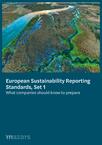
European Sustainability Reporting Standards (ESRS)
In July 2023, the European Commission published the final version of the sector-agnostic European Sustainability Reporting Standards. The standards are based on the Sustainability Reporting Directive (CSRD) and the final version is published in the Official Journal of the EU (effective from 1 January 2024). The set consisst of two general (ESRS 1 and ESRS 2) and ten topical (E1-E5, S1-S4, G1) standards. Reporting entities are currently obliged to use the first set, which is valid for all companies regardless of the sector in which they operate. However, the adoption of so-called sector-specific standards is also planned for the near future.
More information about the first set of standards can be found in the European Sustainability Reporting Standards brochure.



